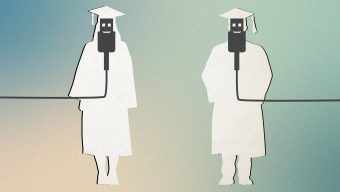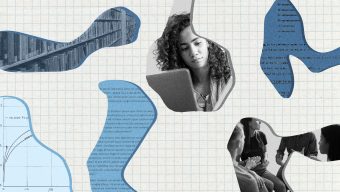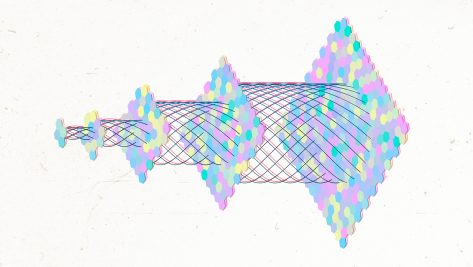There are two fictional characters in films related to education that attract the admiration and affection of most of us.
One is Professor John Keating, portrayed by a splendid Robin Williams in the film Dead Poets Society, directed by Peter Weir and released in 1995. The character, Keating, embodies several key values and principles that serve as the foundation of his teaching philosophy. He encourages his students to think for themselves and challenge the status quo, to stand up for their beliefs and embrace their individuality. He inspires them to break free from societal expectations and pursue their passions and dreams. He instills the love for the humanities, literature, and poetry, and promotes critical thinking and intellectual curiosity. Indeed, Keating believes in the transformative power of education and pursues it, as good educators do. Unfortunately, this story does not end well: he is confronted by the rigidity of old-fashioned conventions and is dismissed.
Another inspiring fictional educator is Katherine Watson, played by Julia Roberts in the 2003 movie Mona Lisa Smile, directed by Mike Newell. A professor of History at the prestigious Wellesley College in the 1950s, Watson is a progressive and feminist intellectual who challenges the traditional gender roles and encourages her female students to think beyond societal norms. She fosters a sense of creativity and artistic expression among her students, values diversity of thought and background, inspiring her students to learn about different cultures and broaden their horizons. She challenges them to develop their own ideas and opinions rather than simply accept the traditional, prescribed roles for women. Some decades have passed since the timeline of this film, but we still need many more Watsons in the education world who may inspire female students, for example in the fields of Management, STEM, and even Philosophy.
We professors have the exciting and transcendent task of encouraging our students to develop their full potential, whatever that may be. It is similar to what that great sculptor Michelangelo believed about his job: to free the forms that were already inside the stone. Our work can be interpreted in a similar way: freeing students’ potential. This is why I closely associate teaching with mentoring. Each one of us has fond memories of those professors who, in retrospect, influenced our personality, inspired our individual way of understanding the world, who conveyed key ideas that helped develop our personal civic virtues. Our true mentors. I myself have vivid memories of my teachers of Literature and Philosophy at school, as well as of some professors at University and my PhD tutors. I sometimes find myself repeating their words, passing on their recommendations or maxims. I can still recall specific moments when they shared valuable pieces of advice or their own experiences – and the memory is generally accompanied by a visual of them smiling. On the surface, this smile may just a pleasant anecdote but smiling while teaching is in fact good practice and, furthermore, the use of humor is an excellent ingredient in education.
Having become a professor myself, I realize that teaching is one of the most engaging and fascinating jobs: it is amazingly enjoyable and fulfilling, and it keeps us docents in the mood while updating our knowledge and interacting with our younger or more senior students. We see, on a daily basis, how education directly impacts society and is the most effective engine, the true catalyst, to transform individuals and the world for the better.
We professors learn a lot from our students, sometimes as much or more than they do from us. Reverse learning is an inestimable and very agreeable facet of teaching and, if we’re lucky, it happens in each and every class that we teach. In fact, those of us who work in education can say that we live twice: we live our own lives and we live out the dreams of the students with whom we have worked and known, and whose development we have contributed to through our guidance and teaching.
The call to academia is sometimes felt genuinely very early, as happened to me. I consider myself enormously fortunate to have been able to dedicate my life to teaching. It is a vocation I identified with while still very young, when I would give classes to my uncomplaining younger siblings. In any case, teaching entails a disposition and frequently a passion for both the development and the transmission of knowledge. Both facets, the generation and the diffusion of ideas, are valuable by themselves and inevitably interdependent. Indeed, research and teaching are both consubstantial to academic careers, and when I meet a scholar who disregards or abandons either of the two, I see that I am in front of a faltering academic.
Technology is a boon to professors, not a threat.
Teaching and interaction with students provide a unique opportunity to test the validity of knowledge. This is always strikingly clear during my annual courses on business strategy – which I have now been teaching for twenty years to our Global MBA students. In fact, as far as management education is concerned, I have found that interaction with managers in class is particularly important, since their behavior and their experiences are the actual object of management research. Is there really any other way to develop business research than by dealing directly with the major business stakeholders?
If research and teaching are two essential and fulfilling activities of academic careers, why do PhDs in management programs at most business schools focus mainly – if not solely – on the development of research skills? In fact, the reduction of PhD programs to the training of research skills is a malaise that has been criticized in different reports over the recent years. I hope that, if the institutions somehow fail to react and solve this problem, it will be the PhD students who endeavor to overcome their estrangement and demand a complete education. The situation makes me think of the popular call addressed to the working class, but targeted to doctoral students: PhDs of The World, Unite!
While it may seem obvious, it deserves to be stressed: the most dignifying and self-rewarding task that we, as educators, can engage in is working with the students within the learning process, particularly through teaching in class.
Management education requires a special sort of scholar, a professional who can combine many different facets, from a solid research background to performing effectively in class and engaging with top managers. Business schools need not only “Gurus”, wise sages who originate new thought, but also “Kangurus”, academics able to jump from their research tasks to teaching, and from there to consultancy or an interview with a journalist. Kangurus of this type are not born but trained, and it normally requires a wide career span to exploit the necessary synergies between those different, apparently contradictory but actually intertwined activities.
I do not mean that other scholarly activities are not necessary to the professional pursuit of academia; I have discussed this before. But the physical, mental, and emotional action of teaching is pivotal to the others. It is then surprising, if not disheartening, that sometimes academics lose this teaching track.
Despite being surrounded by excellent docents, I still dare to offer some suggestions for improving our relationship with students, as well as the quality of teaching:
- Education derives from the Latin term “educare”, meaning caring for our students, knowing their needs, their concerns, aspirations, and their environment. We sometimes think that the best professors are the starry, charismatic speakers. The fact is that the most influential professors are the ones that care for their students and help them in their transformational process to becoming better professionals, good citizens, and well-rounded individuals – provided, of course, that the professor has a solid preparation in their own field and manages the basic teaching skills, including effective communication.
- There are many ways to learn. As opposed to a traditional, uniform, and standard educational formulae, the advantage of learning technologies and alternative methodologies – including new forms of artificial intelligence – facilitate both the personalization of learning and the access to an almost infinite amount of knowledge and information. A main challenge for educators and their institutions is the personalization of learning: how to adapt to each student and their needs, and to help each person develop according to their specific talents. Technology is a boon to professors, not a threat, and the majority of those who have used technology in the learning process realize about its many advantages.
- Evaluating the learning progress and personal development of our students is an essential part of teaching. Learning analytics and new and innovative tools have proven extremely useful in this regard. However, measuring the results of education should not be reduced to a single list of KPIs, a syndrome that I call “measurism”, and is the evaluation of whether an educational program is a success based on supposedly quantifiable and comparable learning outcomes. Education is a continuous, lifelong activity and, in my opinion, measuring the results of a particular learning initiative is similar to taking a photograph: It provides no more than a snapshot. The human mind is complex, and we know from experience that we associate ideas and knowledge with events over time and that our intuition, while established in the early years of education, becomes more sophisticated with each new experience.
- Finally, the Humanities are what cement the rest of the academic disciplines, and all professors, regardless of their teaching and research focus, would do well to instill in their students a taste for History, Literature, or the Arts. Since the foundation of the first universities, the Humanities have been the basis for the practice of civic virtues, and also for expanding our knowledge of the world and respect for others.
Teaching is essentially mentoring and fostering all the potential that lies in wait inside of our students. My favorite quote, supposedly attributed to Irish poet William Butler Yeats, is “Education is not the filling of a pail, but the lighting of a fire.”
© IE Insights.











